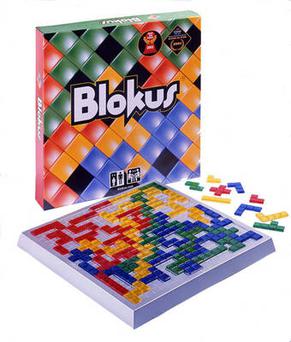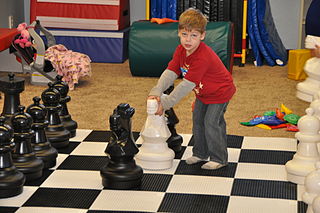
Chromino is a 2001 board game designed by Louis Abraham, for 2 to 7 players. The game is similar to the classic game of dominoes, but uses colours instead of numbers.

Chromino is a 2001 board game designed by Louis Abraham, for 2 to 7 players. The game is similar to the classic game of dominoes, but uses colours instead of numbers.

Five colours are used: red, blue, purple, yellow and green. Each Chromino piece contains three coloured squares laid out in a single row or column, and all 75 possible combinations of colours are used. [1]
There are also five "wild card" pieces, with a yin-yang symbol in the middle, where the middle square may be used as any colour; the two ends of each "wild card" are both coloured in one of the five colours. [1]
The game begins with a randomly chosen "wild card" piece placed on the board. [1] The rest of the pieces (79) are put in the bag and each player draws eight pieces. [1]
The first turn is given to the youngest player and proceeds clockwise. On each player's turn, the player must take one of two actions: [1]
Each piece has eight square edges. At least two edges must touch a piece already on the board for a legal placement, and squares of different colours may not touch each other. [1]
When a player has one piece left, they should display it face-up to the other players. A "wild card" piece may not be used as the final piece. [1] The first player to run out of pieces wins but play continues until the end of the round. There can be more than one winner. [1]

Mahjong or mah-jongg is a tile-based game that was developed in the 19th century in China and has spread throughout the world since the early 20th century. It is commonly played by four players. The game and its regional variants are widely played throughout East and Southeast Asia and have also become popular in Western countries. The game has also been adapted into a widespread online entertainment. Similar to the Western card game rummy, mahjong is a game of skill, strategy, and luck. To distinguish it from mahjong solitaire, it is sometimes referred to as mahjong rummy.

A chessboard is a gameboard used to play chess. It consists of 64 squares, 8 rows by 8 columns, on which the chess pieces are placed. It is square in shape and uses two colours of squares, one light and one dark, in a chequered pattern. During play, the board is oriented such that each player's near-right corner square is a light square.

The rules of chess govern the play of the game of chess. Chess is a two-player abstract strategy board game. Each player controls sixteen pieces of six types on a chessboard. Each type of piece moves in a distinct way. The object of the game is to checkmate the opponent's king. A game can end in various ways besides checkmate: a player can resign, and there are several ways a game can end in a draw.
This glossary of chess explains commonly used terms in chess, in alphabetical order. Some of these terms have their own pages, like fork and pin. For a list of unorthodox chess pieces, see Fairy chess piece; for a list of terms specific to chess problems, see Glossary of chess problems; for a list of named opening lines, see List of chess openings; for a list of chess-related games, see List of chess variants; for a list of terms general to board games, see Glossary of board games.

International draughts is a strategy board game for two players, one of the variants of draughts. The gameboard comprises 10×10 squares in alternating dark and light colours, of which only the 50 dark squares are used. Each player has 20 pieces, light for one player and dark for the other, at opposite sides of the board. In conventional diagrams, the board is displayed with the light pieces at the bottom; in this orientation, the lower-left corner square must be dark.

Sorry! is a board game that is based on the ancient Indian cross and circle game Pachisi. Players move their three or four pieces around the board, attempting to get all of their pieces "home" before any other player. Originally manufactured by W.H. Storey & Co in England and now by Hasbro, Sorry! is marketed for two to four players, ages 6 and up. The game title comes from the many ways in which a player can negate the progress of another, while issuing an apologetic "Sorry!"

Torres is a German-style board game designed by Wolfgang Kramer and Michael Kiesling and published in 1999 by FX Schmid in German and by Rio Grande Games in English. The game strongly influenced Kramer and Kiesling's Mask Trilogy of games, but is not considered to be a part of the trilogy. The game has since been reprinted.

Chu shogi is a strategy board game native to Japan. It is similar to modern shogi in its rules and gameplay. Its name means "mid-sized shogi", from a time when there were three sizes of shogi variants that were regularly being played. Chu shogi seems to have been developed in the early 14th century as a derivative of dai shogi. There are earlier references, but it is not clear that they refer to the game as we now know it.

Blokus is an abstract strategy board game for two to four players, where players try to score points by occupying most of the board with pieces of their colour. The board is a square regular grid and the pieces are polyominoes. It was designed by French mathematician Bernard Tavitian and first released in 2000 by Sekkoïa, a French company. It has won several awards, including the Mensa Select award and the 2004 Teacher's Choice Award. In 2009, the game was sold to Mattel.
Scrabble variants are games created by changing the normal Scrabble rules or equipment.

The touch-move rule in chess specifies that a player, having the move, who deliberately touches a piece on the board must move or capture that piece if it is legal to do so. If it is the player's piece that was touched, it must be moved if the piece has a legal move. If the opponent's piece was touched, it must be captured if it can be captured with a legal move. If the touched piece cannot be legally moved or captured, there is no penalty. This is a rule of chess that is enforced in all formal over-the-board competitions. A player claiming a touch-move violation must do so before themselves touching a piece. Online chess does not use the touch rule, letting players "pick up" a piece and then bring it back to the original square before selecting a different piece, and also allowing players to premove pieces while waiting for the opponent to move.
Hive is a bug-themed tabletop abstract strategy game, designed by John Yianni and published in 2001 by Gen42 Games. The object of Hive is to capture the opponent's queen bee by allowing it to become completely surrounded by other pieces, while avoiding the capture of one's own queen. Hive shares elements of both tile-based games and board games. It differs from other tile-based games in that the tiles, once placed, can then be moved to other positions according to various rules, much like chess pieces.

Ingenious is the English name for Einfach Genial, a German abstract strategy board game designed by Reiner Knizia under commission from Sophisticated Games and published in 2004 by Kosmos. Across most of Europe it is titled as the local translation of Ingenious or Simply Ingenious, the notable exception being Mensa Connections in the UK.

Tsuro is a tile-based board game designed by Tom McMurchie, originally published by WizKids and now published by Calliope Games.

The Game of the Generals, also called GG or GOG as it is most fondly called, or simply The Generals, is an educational war game invented in the Philippines by Sofronio H. Pasola Jr. in 1970. Its Filipino name is "Salpakan." It can be played within twenty to thirty minutes. It is designed for two players, each controlling an army, and a neutral arbiter to decide the results of "challenges" between opposing playing pieces, that like playing cards, have their identities hidden from the opponent.

Qwirkle is a tile-based game for two to four players, designed by Susan McKinley Ross and published by MindWare. Qwirkle shares some characteristics with the games Rummikub and Scrabble. It is distributed in Canada by game and puzzle company Outset Media. Qwirkle is considered by MindWare to be its most awarded game of all time. In 2011, Qwirkle won the Spiel des Jahres, widely considered the most prestigious award in the board and card game industry. A sequel, Qwirkle Cubes, was released by Mindware in 2009.
The fictional universe of the Discworld novels by Terry Pratchett features a number of invented games, some of which have gone on to spawn real-world variants.
Café International is a 1989 tile-laying board game created by Rudi Hoffmann that won the Spiel des Jahres in 1989.

Brazilian draughts is a variant of the strategy board game draughts. Brazilian Checkers follows the same rules and conventions as International draughts, the only differences are the smaller gameboard, and fewer checkers per player.